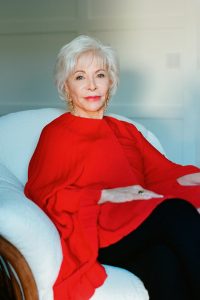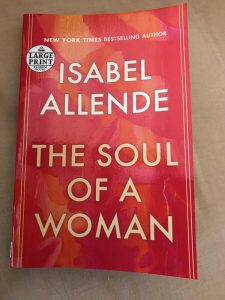Last Saturday, while visiting Aurora Books, Kim Malcolm’s new English-language bookstore here in San Miguel de Allende, a newly stocked, large-print book jumped out at me, and I had to buy it. The title alone grabbed me: The Soul of a Woman. And seeing that the author was now-eighty-one-year-old Chilean-American writer Isabel Allende, whom I’ve always admired, sealed the deal. I read it from cover to cover this week on one rainy afternoon.
But first, a word about the large print. It could be that my mother’s prophesy about my ruining my eyesight by reading by flashlight under the bedcovers during my formative years came true. Or, more recently, I burnt out my eyes from too much close reading and editing during my writing/editing career. Or maybe it’s just that book publishers are now using much smaller typefaces for their paper books – to save trees, perhaps?
Whatever the reason, I now have only two book-reading choices: Kindle books, where the type size can be easily increased, or large-print books. And I’ve already read all of the large-print books that interest me on the shelves of our city’s wonderful Biblioteca (public library) in centro.
The Soul of a Woman spoke to me this week, and I urge all of my women friends and WOW readers to read it. This book – Isabel Allende’s fifth nonfiction book; she’s also authored twenty-two novels and won many literary awards – is what she refers to as “an informal chat.” In it she shares her thoughts about just about all the issues that concern us women today: family, patriarchy, religion, feminism, equality, beauty, love, passion, aging, ageism, assisted death, and more. She is clear, honest, down-to-earth, and as straight-forward as a dear old friend.

On the subject of aging, for example, she writes: “While my body deteriorates, my soul rejuvenates. I suppose my defects and virtues are also more visible. I spend and waste too much and am more distracted than before, but I also have become less angry; my character has softened a little. My passion for the causes I have always embraced and for those few people I love has increased. I do not fear my vulnerability because I no longer confuse it with weakness. I can live with my arms, doors, and heart open.”
Elsewhere, she adds: “I have chosen a simpler life, with fewer material things and more leisure, fewer worries and more fun, fewer social commitments and more true friendship, less fuss and more silence.”
At one point she tackles the seemingly age-old question, What do women want? Her response is simply: “This is what women want: to be safe, to be valued, to live in peace, to have their own resources, to be connected, to have control over their bodies and lives, and above all, to be loved.”
At only 225 pages (in the large-print edition), this is a book to curl up with on a rainy afternoon when you feel you need some wise words from an old woman friend. Following is an excerpt that I found particularly poignant and important.
Yes, I agree with her that we need “to give the world a formidable shake.” But how, exactly, do we do that? I’d love to know. I invite your thoughts in the Comments section below.
~ ~ ~ ~ ~ ~ ~ ~ ~ ~ ~ ~ ~ ~ ~
According to the Dalai Lama, the only hope for peace and prosperity lies in the hands of women in the West. I suppose it’s because they have more rights and resources than others, but I would not exclude the rest of the women in the world. The task belongs to all of us.
For the first time in history there are millions of educated women who are informed, connected, and determined to change the civilization in which we live. We are not alone; many men are with us in this, almost all young – our sons and grandsons.
This is the era of emboldened grandmothers, and we are the population’s fastest-growing group. We are women who have lived long lives; we have nothing to lose and therefore are not easily scared; we can speak up because we don’t care to compete, to please, or to be popular; and we know the immense value of friendship and collaboration. We are anxious about the situation of humanity and the planet. Now it’s a matter of agreeing to give the world a formidable shake. (pp. 108-9)
~ ~ ~ ~ ~ ~ ~ ~ ~ ~ ~ ~ ~ ~ ~ ~
Note:
- Last week’s WOW, “What it Means to be Retired,” garnered nearly forty responses. If you missed this post or this lively conversation, be sure to go to: blog.bonnieleeblack.com/what-it-means-to-be-retired/ .
- For more information about author Isabel Allende and her humanitarian work, go to her website: isabelallende.com .
- Aurora Books is located in the little plaza on Calzada de la Aurora #48 in Colonia Guadalupe in SMA; contact: aurorabookssma@gmail.com . For my earlier blogpost about this charming new bookstore, read: blog.bonnieleeblack.com/kim-malcolm/.

